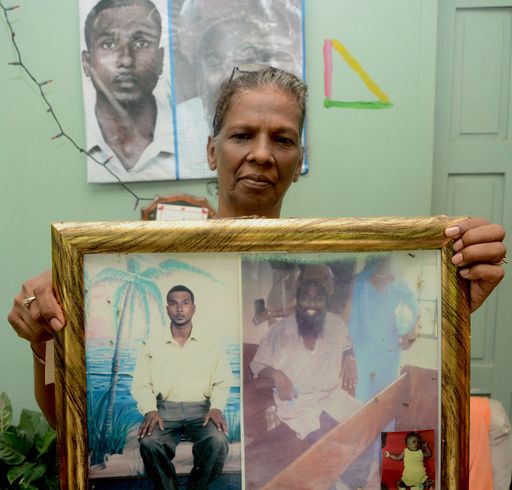(Trinidad Guardian) Clothes, photos, shoes, even a bank card and other personal items belonging to Neil, 25, and Nigel Seebran, 23, are cherished and closely guarded by their family at their Granville, Cedros home. Oftentimes, their parents, Chatagoon and Geeta Seebran, both 63, can be heard speaking to their sons with whom they shared a strong bond but the response is always the same—a gut-wrenching silence.
This is because 14 years ago, the brothers were asleep in their bedrooms when they were attacked, tied up and taken to a bushy area at the back of their home where they were chopped to death. Their killers dug a hole, threw their bodies in and buried them. In an attempt to throw off suspicion, the killers planted trees on top of the grave.
Unaware that they were beneath the dirt just 100 feet behind their home, for 56 days their parents, older sister Sally, other relatives, villagers and friends carried out searches in and around the area.
With no clue about their whereabouts, the family still clung to the hope that they were alive. Then, one rainy morning, villager Franklin Francis “guided by a vision from God” found the grave. There was a lot of speculation about who killed them and why but the police had no evidence to arrest anyone until four years later when Kareem Guadeloupe, of Point Fortin, allegedly confessed to police that he was with two men, “Sugars” and “Scrap,” who killed the brothers, but that his role was only to dig the grave.
Last month, however, following a trial in which Guadeloupe claimed he was tricked by the police into signing a statement he did not give, a jury in the San Fernando Supreme Court found him not guilty and he was set free. This was an outcome the Seebran family did not anticipate, resulting in their emotional wounds being ripped open again, flooding them with vivid memories of the murders that brought them despair, anger and sadness.
Perusing several newspaper clippings from 2005 to present at their Syfoo Trace home, Geeta smiled but it failed to hide the sadness in her eyes. The bedroom she shares with her husband is decorated with their sons’ photos, newspaper clippings and their favourite jerseys hanging on clothes racks and is similar to a shrine.
Neil and Nigel’s clothes are kept in bags in a wardrobe in Neil’s bedroom, which is now being used by their niece. In the living room, their shoes are proudly displayed on the space saver, as well as Neil’s bank card.
“I want to keep them around me. The memories and these things are all I have of them,” said their mother as she vowed never to stop fighting for justice for her two sons.
There will always be an emptiness in the Seebran’s home and in their hearts.
Wiping away her tears, Sally said, “The pain will never go away. Is like a broken record. It don’t have a day that goes by that I don’t think about what life could have been if my brothers were here. We were happy. We are a happy family, always laughing.”
Geeta said her sons were playful, humble and always willing to help someone.
She fondly recalled, “When my back hurting, Neil will squeeze my back for me. If my foot dirty, he will wet a cloth and wipe it for me.”
She admitted that her sons sometimes got in “a lil conflict in the rum shop,” but they were not “Bad Johns.” Geeta lost another child, her youngest, at one-year-and-six months. He was diagnosed with Down Syndrome. She called on other parents and people who are fighting for justice for their loved ones who were murdered to band together. “I think it is time we stand up, protest, do something. It is so unfair to us.”

